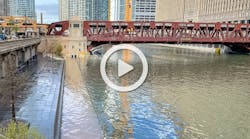PWSA completes first steps of integrated watershed plan
The Pittsburgh Water and Sewer Authority (PWSA) announced that it has completed its initial work on the large-scale Saw Mill Run Integrated Management Plan, and will now delegate the plan's leadership to a local non-profit.
In 2014, the PWSA initiated the first integrated watershed management plan in Southwestern Pennsylvania. This plan brought together the 12 municipalities within Saw Mill Run as well as ALCOSAN, 3 Rivers Wet Weather, Economic Development South, the Pennsylvania Department of Environmental Protection, and the Army Corps of Engineers to develop a plan that outlines priority projects to address the prevalent flooding and stormwater challenges along Route 51.
The collaborative planning effort resulted in the Saw Mill Integrated Watershed Management Plan, which was completed in 2020. The overall goal of the plan is to transform the Saw Mill Run stream — from a corridor plagued by flooding and pollution into a regional asset with fishable and swimmable waters, and high-quality economic development.
The plan provides municipalities with a path to comply with environmental regulations, reduce sewer overflows and certain pollutants, and address flooding issues. The plan also aims to take a watershed-wide approach that solves multiple water issues while fostering economic development, increasing public health, and beautifying neighborhoods.
As part of the planning process, PWSA has spent $3.4 million performing a data inventory, creating a monitoring program to analyze water quality and quantity, and developing collection models that prioritize and determine the level of control needed for each pollutant to improve the health of the stream.
PSWA also completed two early action projects: a stream restoration project at two locations within Saw Mill Run and the construction of a rain garden at Volunteers Field. As of now, other municipalities are pursuing individual, smaller projects within their boundaries: like Bethel Park’s stream restoration project and a new stream restoration project in the City of Pittsburgh.
The authority also announced that Watersheds of South Pittsburgh, a local non-profit organization, will begin to take on a lead role for implementing the Saw Mill Run Integrated Watershed Management Plan.
Watersheds of South Pittsburgh represents the entire Saw Mill Run watershed. It will work to coordinate restoration efforts that benefit each municipality and the collective watershed. In this new role, Watersheds of South Pittsburgh will coordinate the municipalities to invest in collaborative regional projects.
“Managing water resources can be complex; rivers and streams generally flow through multiple political jurisdictions, complicating the decision-making process around issues that affect them,” stated Lisa Werder-Brown, Executive Director of Watersheds of South Pittsburgh. “Working within the geographic boundaries of a watershed offers opportunities to coordinate efforts and create solutions to improve and protect water quality.”
“I am proud of the work that our staff and regional partners have put in to develop and advance this collaborative and innovative plan for the Saw Mill Run watershed,” stated Will Pickering, Chief Executive Officer of the Pittsburgh Water and Sewer Authority. “We are excited to continue to partner and support this next implementation phase.”


